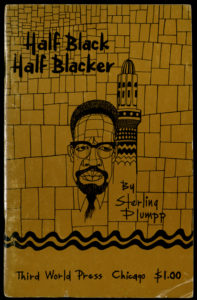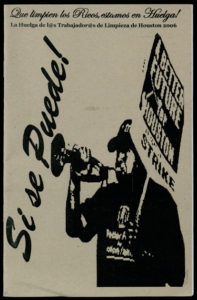
University of Houston is excited to announce its procurement of the Zine Fest Houston Records! Consisting primarily of zines (self-published, small circulation, non-commercial booklets or magazines), ephemera, and print items, the collection documents zine culture in Gulf Coast region and throughout the country. Materials in the collection range from the 1980s to present, and focus on a range of topics, including art, feminism, LGBTQ issues, Latina/o’s, and humor.
Curator and archivist for the collection, Lisa Cruces, states, “I’m thrilled to have the ZFH records finally here! Because of their format and the perception of being disposable, zines and other smaller publications are often overlooked, but in my opinion they are valuable snapshots of communities.”
Acquired from zinester, Shane Patrick Boyle, and Zine Fest Houston organizers, Maria-Elisa Heg, Stacy Kirages, and Sarah Welch, the collection is the result of their personal collecting, as well as contributions from the annual Zine Fest Houston event. Usually held in the fall, Zine Fest is a grassroots event dedicated to promoting zines, mini-comics, and other forms of small press, alternative, underground, DIY media, and art. More information on the festival and related events can be found here at the Zine Fest Houston website.
Currently 10 linear feet in size, the Zine Fest Houston Records will continue to grow. “We agreed to donate the Zine Fest Houston Archive to University of Houston because we wanted to share and celebrate the history of the organization and the zines that have been produced by the artists, creators, and activists of South Texas from the early 1990s through today with the entire Houston community, and students, visiting scholars and professors at the University. The University of Houston is also a good fit in terms of location and archive storage facilities. We couldn’t be happier with the partnership that has formed and look forward to adding to the collection throughout the years,” state Heg, Kirages, and Welch.
The Zine Fest Houston Records are currently being processed but open to researchers. For more information, contact Lisa Cruces, ecruces@uh.edu.

cover of “Sing With Tenneco” vinyl record, undated (Tenneco Energy History Records)
The University of Houston Special Collections is proud to announce the acquisition of the Tenneco Energy History Records as a part of our Energy & Sustainability collections.
In Macon County, Tennessee, shortly after the discovery of natural gas in 1933, Wade Thompson founded Tenneco Gas. In 1943 Henry Gardiner Symonds became the first president of the newly established Tennessee Gas Transmission Company in Houston. The company would be rebranded as Tenneco in 1966, diversifying its business interests and acquiring assets from other industries, targeting failing companies for rehabilitation and profit. Eventually, Tenneco’s holdings included manufacturing, construction, agriculture, shipbuilding, automotive, a chemical company, and, yes, the transmission of natural gas.
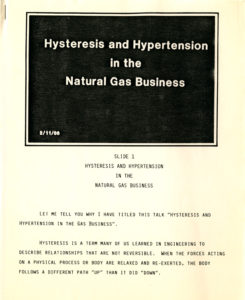
cover of speech, “Hysteresis and Hypertension in the Natural Gas Business,” 1986 (Tenneco Energy History Records)
As the price of oil dropped and the energy economy contracted in the 1980s, financial strains prompted Tenneco to break up the Tenneco Oil Exploration Company and sell off oil and gas assets to multiple suitors including Chevron, Amoco, Mobil, and Conoco in 1988. In the 1990s, Tenneco further reorganized around their automotive and packaging business, selling off their other diffused businesses.
Now, thanks to the generosity of Gary Cheatham, the contributions of Joe B. Foster, and the efforts of many others, the Tenneco Energy History Records are available for research at the University of Houston, in the heart of the nation’s Energy Capital. Foster held a number of positions with Tenneco following his graduation from Texas A&M University in 1957. He was named Chief of Planning and Economic Analysis for Tenneco Oil Exploration and Production in 1968, assumed the role of president of Tenneco Oil in 1978, and retired after 31 years of service to Tenneco as the company altered their strategic direction in 1988. Included in the records are Foster’s notes, speeches, and research over the years, providing some fascinating insight into the energy industry that goes well beyond a simple “boom” or “bust” understanding of decades of tumult in the energy industry. Materials date back to policy documents from the 1970s, exploration reports in the 1980s, and plans related to the reorganization and sell-offs of Tenneco’s various assets in the late 1980s and 1990s.
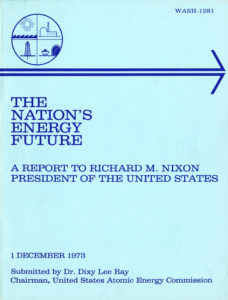
cover of “The Nation’s Energy Future,” 1973 (Tenneco Energy History Records)
The Tenneco Energy History Records serve as a critical piece of our larger Energy & Sustainability collections. Thanks to the assistance of Dr. Joseph Allen Pratt, UH Special Collections has pooled a number of archives, books, and journals that document the history of energy production and its relation to the environment. We encourage researchers to visit our reading room to sample the Tenneco Energy History Records as well as other resources like our Joseph S. Cullinan Papers, the Terry Tarlton Hershey Papers, or the H. David Kaplan Schlumberger Well Services Collection.
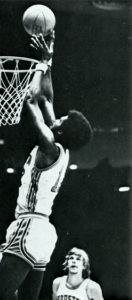
Dwight Jones tips it in against the University of Southwestern Louisiana (Houstonian, 1973)
Last week we lost a Houston basketball icon in Dwight Elmo Jones, who passed away on July 25, 2016 after battling a heart ailment over a number of years.
Before Clyde Drexler dunked his way to H-Town fame at Sterling High School, helped establish Texas’ Tallest Fraternity, and claimed an NBA title with his hometown Houston Rockets, Dwight Jones had already established himself as arguably the greatest high school basketball player in Houston history. Born in 1952 in Houston, Jones led Wheatley High School to three straight state championships from 1968 to 1970, played for the Cougars from 1971 to 1973, and even contributed to the Houston Rockets, from 1976 to 1979.
Coaches and teammates of Jones remember him being a special talent from a young age. Playing as a man among boys, playground lore suggests he was already dunking a basketball in the seventh grade. In high school, his Wheatley Wildcats racked up a remarkable 102-2 record and as a senior he averaged 28 points and 24 rebounds a game for the Wildcats in the newly desegregated University Interscholastic League. Recruited by the legendary Guy V. Lewis, Jones played on two NCAA Tournament teams for the Cougars while also leading the 1972 USA Olympic team in scoring before being ejected in the infamous gold medal game, as the Americans fell to the Soviets. Jones was drafted by the Atlanta Hawks in 1973 before joining the Rockets in 1976. His career in the NBA would run through the early 1980s and include stops with the Chicago Bulls and the Los Angeles Lakers.
A fierce competitor, his resolve was no doubt tested when he heard himself declared dead prematurely in an emergency room in 2012. Yet, to everyone’s surprise (except perhaps those closest to him), he survived the surgery and battled his illness with a fervent spirit for nearly four more years. In remembering Jones, current University of Houston Head Coach Kelvin Sampson said, “Dwight was a tremendous competitor, who represented the University of Houston and his nation well during his playing career. While his health declined in recent years, he faced those challenges with the same courage and spirit that made him one of our program’s greats. Tonight, our hearts go out to Dwight’s family and friends and all those who knew and loved him.” The Jones family has established a gofundme page to help defray the expenses they now face.
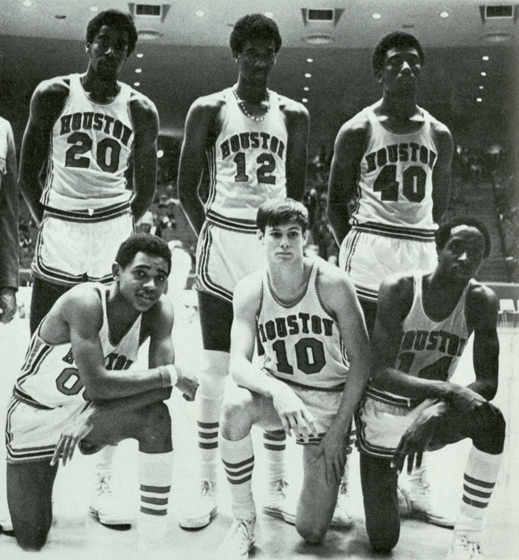
Dwight Jones (#12) and his freshman teammates pause for an impromptu team photo of the Cougar Kittens (Houstonian, 1971)
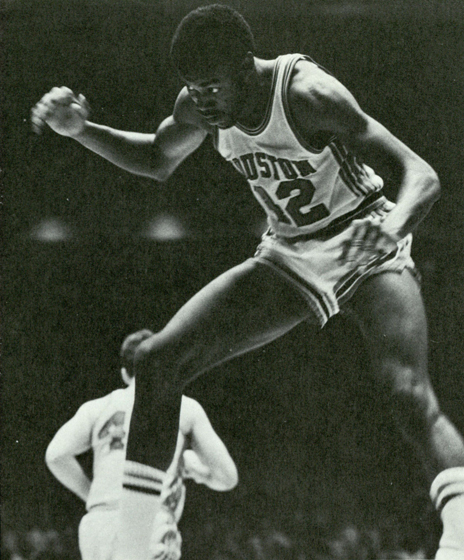
Jones showed his potential early as a freshman, scrimmaging against the Cougars’ varsity team (Houstonian, 1971)
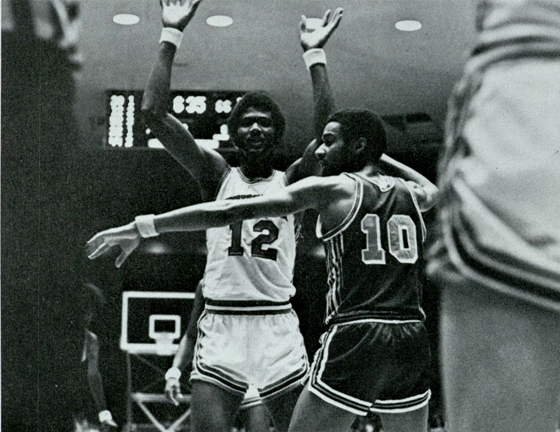
Jones awaits the inbound pass (Houstonian, 1973)
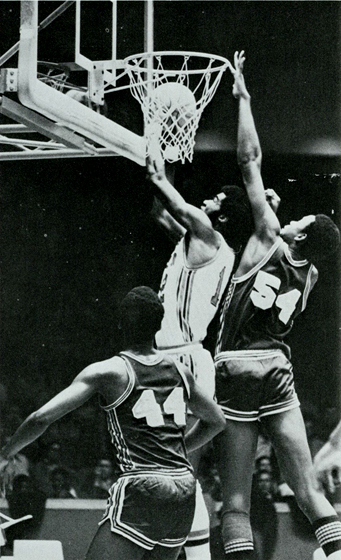
Jones scores two against tough defense (Houstonian, 1973)
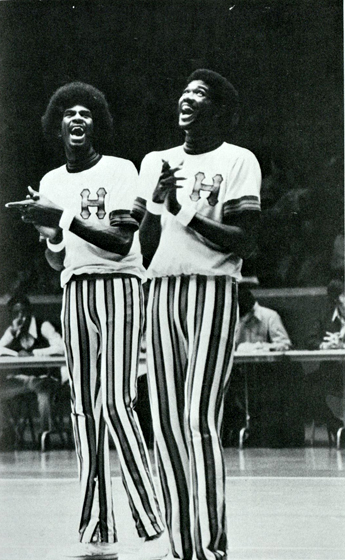
“Sweet Lou” Dunbar and Dwight Jones share a lighter moment during the pregame (Houstonian, 1973)
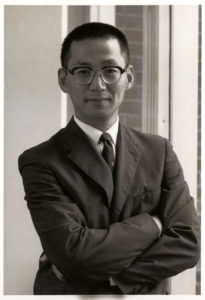
Professor Jay K. Kochi (1962, Professor Jay K. Kochi Papers)
The University of Houston Special Collections and University Archives are proud to announce the publication of the finding aid for the Professor Jay K. Kochi Papers.
Known as a leader in the field of organic chemistry, Dr. Jay Kazuo Kochi (1927-2008) was born May 17, 1927 in Los Angeles, California. As WWII raged, Kochi’s family was relocated to an internment camp in Arizona when he was 15. Kochi would graduate high school in the camp before studying at UCLA (Bachelor of Science, 1949) and Iowa State (Doctorate, 1952). He worked as an instructor at Harvard (1952-55) and completed a fellowship at Cambridge (1955-56) before going to work as a research scientist in exploratory chemistry for Shell Development Co. (1956-1962). Kochi would later return to academia, holding positions at Case Institute of Technology (or Case Western Reserve), Indiana University, and finally arriving at the University of Houston in 1984.
Best known for developing a one-carbon oxidative degradation of carboxylic acids known as the Kochi Reaction, his career is marked by accolades and recognition. A member of National Academy of Sciences, Professor Kochi was also a recipient of the Alexander Von Humbolt U.S. Senior Scientist Award, the American Chemical Society’s Arthur C. Cope Scholar Award, and the James Flack Norris Award. Inquisitive to the end, Kochi’s continued to contribute his research findings in the field of organic chemistry until his death in 2008 at the age of 81.
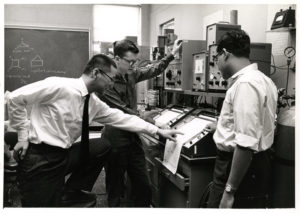
Prof. Kochi and others at work in the lab (undated, Professor Jay K. Kochi Papers)
The University of Houston Special Collections is honored to offer a home for Dr. Kochi’s papers. As a part of our larger University Archives, the Professor Jay K. Kochi Papers will stand beside the collections of other professors and luminaries who have helped define and guide the University. Spanning over 120 linear feet, the collection includes research, correspondence, photographs, and publications penned by Kochi. Those interested in learning more about the life and career of Dr. Kochi should visit our new finding aid for a detailed inventory of the materials included in the collection. When you are ready to visit, we look forward to assisting you with your research.
The University of Houston Special Collections is proud to announce the publication of a new finding aid for the Herman George Eiden Papers. Sara Wheeler, graduate student intern from the Simmons School of Library and Information Science, has recently completed the processing of the papers, penned the new finding aid, was generous enough to share her thoughts on the new collection below, as well as present some highlights from the collection via a small exhibition currently on display at the entrance to Special Collections, near the Morrie & Rolaine Abramson Grand Staircase.
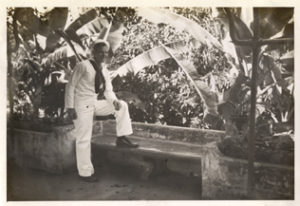
At the aquarium, Manila, Philippines, November 1940 (Herman George Eiden Papers)
In 1939, 18-year-old Herman George Eiden joined the United States Navy. Like many his age, Eiden had the opportunity to see the world through his service. Eiden was able to take photographs of his travels, send letters home, and even film some of his travels. He was able to do this all while aboard the USS Lexington and then USS Houston (CA-30). The University of Houston Special Collections recently received the donation of these photo albums, scrapbooks, films, and letters of Eiden’s for inclusion among the USS Houston & Military History collections.
The Herman George Eiden Papers include three photo albums, memorabilia, and clippings that Eiden put together and sent home to his family in Louisville, Kentucky. In the photos, Eiden captured his travels to Panama, Hawaiʻi, Guam, China, and the Philippines. Most of his time was spent in the Philippines, where he and his shipmates were able to take in the local color, enjoying sightseeing trips to places such as Old Manila, Pasig River, and Pagsanjan Falls.
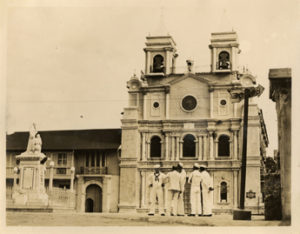
Church of the Third Order of the Franciscans (Herman George Eiden Papers)
The photos include life aboard the USS Houston (CA-30). There are images of Navy sailors swimming off the side of the ship, boxing matches, as well as pictures of the ship’s band. Also included are photos of the changing of command, as Captain Rooks takes over for Captain Oldendorf.
Eiden also sent six film reels home. These film reels have all been digitized to allow quick and easy access for contemporary scholars. Along with the reels, Eiden included a narrative log that provides details to correspond with each part of the film.
While serving in the Navy, Eiden achieved the rank of Fireman First Class. He was aboard the ship during the Battle of the Java Sea and the USS Houston’s final battle, the Battle of Sunda Strait. Eiden, alongside 692 of his comrades, perished during this attack on March 1, 1942.
After the sinking of the USS Houston, it took almost nine months for news of the fate of the ship and her crew to reach home. Eiden’s family saved his obituary and news articles about the sinking of the USS Houston (CA-30) that were published in their local newspaper, The Courier-Journal of Louisville.
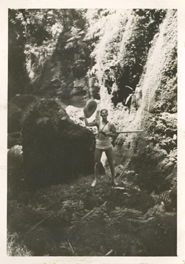
“Well, so long! Hope you have enjoyed my pictures.” Herman George Eiden, February 1941 (Herman George Eiden Papers)
One of his sisters, Clara Imelda Eiden Sivori, also received the USS Houston (CA-30) Survivors Association and Next Generations newsletters, which are a part of the collection. She and other relatives were able to attend the 60th commemorative ceremony in Houston for the USS Houston (CA-30) and those photos are also included in the collection.
Those interested in getting a closer look at the Herman George Eiden Papers are encouraged to see it in person by visiting our reading room, as well as visiting the two exhibit cases just outside of the entrance to Special Collections where select materials are on display for a limited time. Finally, those interested in more information on this collection or the Cruiser Houston Collection should contact Christian Kelleher, Head of Special Collections and curator of the USS Houston & Military History collections.
